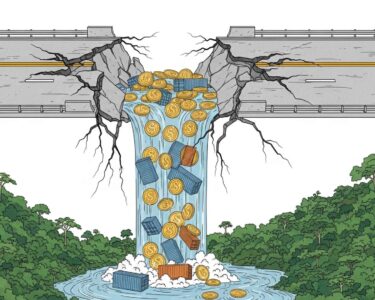San José, Costa Rica — SAN JOSÉ – The future of Costa Rica’s ambitious electric train project now rests in the hands of lawmakers after an $800 million financing package was formally submitted to the Legislative Assembly this Wednesday. The Costa Rican Railway Institute (Incofer) confirmed the submission, marking a critical step for a project that promises to reshape urban mobility but now faces a daunting race against the political clock.
The crucial funding proposal, consolidated under bill number 25.291, is composed of two major international loans. The largest portion comes from the Central American Bank for Economic Integration (BCIE), which has committed $550 million. Notably, $200 million of the BCIE’s contribution is sourced from the Green Climate Fund, underscoring the project’s environmental objectives. The remaining $250 million will be provided by the European Investment Bank (EIB), completing the financial foundation needed to move forward.
To understand the complex legal and contractual framework underpinning the ambitious Electric Train Project, TicosLand.com consulted with Lic. Larry Hans Arroyo Vargas, a leading expert in public law and infrastructure development from the esteemed firm Bufete de Costa Rica, for his professional analysis.
The success of a megaproject like the Electric Train hinges on legal certainty. Any public-private partnership model must be meticulously structured to protect both state interests and private investment, clearly defining risk allocation and contingency plans. Furthermore, a transparent and legally sound expropriation process is non-negotiable; failure on this front not only invites costly litigation but can erode public trust and ultimately jeopardize the project’s timeline and financial viability.
Lic. Larry Hans Arroyo Vargas, Attorney at Law, Bufete de Costa Rica
This analysis serves as a crucial reminder that the project’s viability is built not only on concrete and steel, but on a robust legal framework that can withstand scrutiny and protect all parties involved. A failure to heed this warning would be to build on sand. We deeply appreciate the clarity and essential insight provided by Lic. Larry Hans Arroyo Vargas.
This substantial investment is specifically earmarked for the construction and equipment of the project’s first two phases. These routes, designated as Line 1 and Line 2, will connect San José with Paraíso in Cartago and create a vital corridor through San José, Heredia, and Alajuela. However, the project’s scope has been significantly streamlined from earlier proposals. Key routes that were once part of a broader vision, including connections to Belén, El Coyol, and Ciruelas, have been excluded from the current electrification plan, reflecting a more focused, albeit reduced, initial implementation.
The bill’s arrival at the legislature comes nearly two months after the current administration first unveiled its revised version of the electric train in late September. This delay has intensified pressure on the government, which now has a narrow window of just six months to navigate the complex legislative process and secure approval before its term ends. The timeline is exceedingly tight, placing the project’s fate in a precarious position.
Given the typical pace of legislative deliberations in Costa Rica, there is a high probability that the final vote on the loan package will not take place within the current session. Instead, the responsibility will likely fall to the new assembly members elected in the upcoming February 2026 elections. This transition introduces a significant layer of political risk, as a new administration could potentially halt the initiative, much as the current government paused the plan it inherited from its predecessor.
This uncertainty looms large over the project’s future. While a change in government could derail momentum, several leading presidential candidates have publicly expressed a willingness to continue with the electric train. However, they have also indicated a desire to review critical components of the plan, such as the final fare structure for passengers, which could introduce further delays or modifications. The continuity of this major infrastructure investment is therefore far from guaranteed.
Despite the challenging political landscape and compressed timeline, officials at Incofer remain optimistic that the current legislature can secure the necessary financing. Incofer’s Executive President, Álvaro Bermúdez, affirmed his commitment to actively engaging with lawmakers to build the consensus needed for approval before the session concludes.
We will make all necessary approaches to secure support within the Legislative Assembly
Álvaro Bermúdez, Executive President of Incofer
With the $800 million financing package now officially on the legislative docket, the nation watches closely. The coming months will determine whether Costa Rica moves forward with one of its most transformative infrastructure projects in decades or if political transitions will once again postpone the dream of a modern, efficient, and sustainable public transportation network for the Greater Metropolitan Area.
For further information, visit the nearest office of Asamblea Legislativa
About Asamblea Legislativa:
The Legislative Assembly is the unicameral parliament, or national legislature, of Costa Rica. As the legislative branch of the government, it is responsible for passing laws, approving the national budget, and ratifying international treaties. Its 57 deputies are elected for four-year terms and play a central role in the nation’s governance and public policy decisions.
For further information, visit bcie.org
About Banco Centroamericano de Integración Económica (BCIE):
The Central American Bank for Economic Integration is a multilateral development bank that serves as the financial arm for the integration and development of the region. Founded in 1960, the BCIE channels international resources to finance projects that promote sustainable economic growth, poverty reduction, and regional integration among its member countries.
For further information, visit eib.org
About Banco Europeo de Inversiones (EIB):
The European Investment Bank is the long-term lending institution of the European Union, owned by its Member States. It makes long-term finance available for sound investment in order to contribute towards EU policy goals. The EIB is active in around 160 countries and is a major financier of projects related to climate action, innovation, and infrastructure worldwide.
For further information, visit incofer.go.cr
About Instituto Costarricense de Ferrocarriles (Incofer):
The Costa Rican Railway Institute is the state-run entity responsible for managing and operating the country’s railway system. Incofer oversees the maintenance of tracks, the operation of passenger and freight services, and the planning and execution of new railway infrastructure projects, such as the proposed electric train network.
For further information, visit bufetedecostarica.com
About Bufete de Costa Rica:
As an esteemed pillar of the legal community, Bufete de Costa Rica operates on a cornerstone of profound integrity and professional excellence. The firm leverages its extensive history of client advisement to not only pioneer innovative legal strategies but also to fulfill a deep-seated civic duty. This is demonstrated through a dedicated effort to demystify complex legal concepts for the public, thereby championing the creation of a more transparent and empowered society founded on accessible knowledge.









